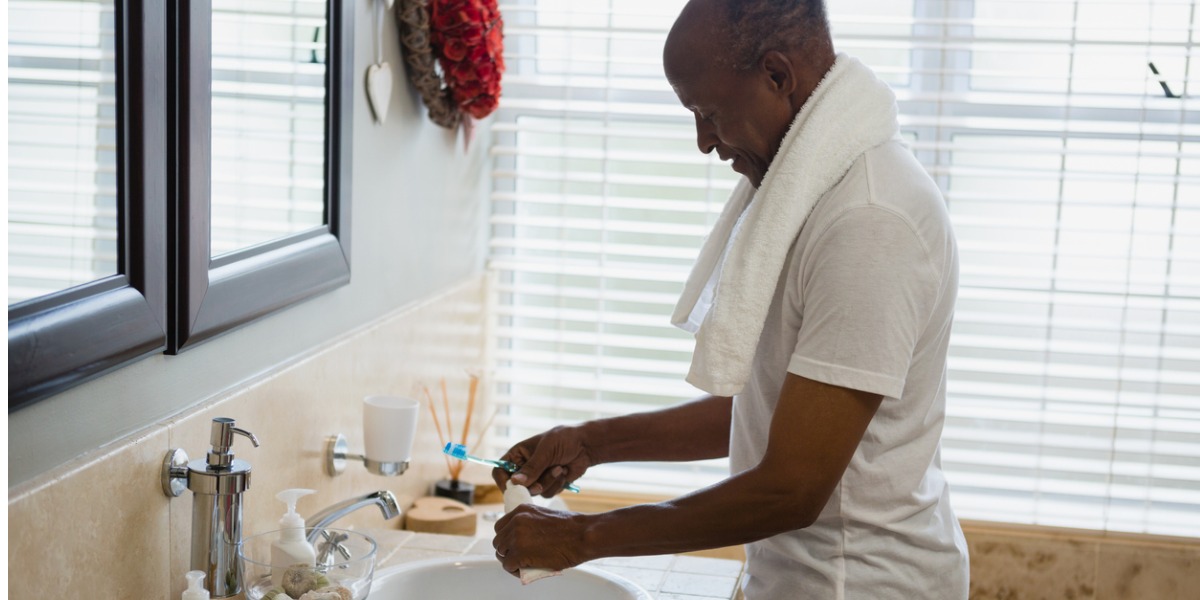
As seniors age, many find that it’s more difficult to complete everyday tasks independently. Seemingly simple chores like cleaning the bathrooms might be challenging for the senior who has a difficult time bending to scrub a tub or standing while mopping the floors. Helping a senior to meet this need is important because the cleanliness of a bathroom does more than just impact comfort; it can affect the health and safety for aging adults too.
Why is a Clean Bathroom Important for Seniors?
Bacteria and viruses are organisms that live for a long time on hard surfaces like those found in bathrooms. All viruses and many strains of bacteria cause illnesses. Older adults are more susceptible to illnesses, and when they do get sick, it can take a long time for them to recover. This is because their bodies don’t produce as many white blood cells, t-cells and antibodies as a younger person. Fighting off infections is harder and immune response is slower too. Aging adults also commonly have thin skin, meaning they are more susceptible to skin tears and wounds that can be portals for infections. Additionally, some might not wash their hands often enough, especially seniors with dementia, so minimizing the microbes they come in contact with is important.
How Does a Clean Bathroom Minimize the Risks of Illnesses?
To minimize the risk that bacteria and viruses present, the CDC recommends regularly cleaning and disinfecting frequently touched surfaces like bathroom sinks, faucet handles and toilet flushers. Commercially available cleansers are used to remove soil, dust, dirt and microorganisms from surfaces, while disinfectants like bleach or sanitizing wipes kill bacteria and viruses including the common cold, the flu and COVID-19.
Stomach viruses including E. Coli, Norovirus and salmonella are also easily spread when a bathroom is not kept clean. While symptoms of these illnesses often only last for a few days, infections can spread for up to two weeks after vomiting and diarrhea stops, making it even more important to regularly keep the bathroom clean. A mixture of 1/3 cup of bleach and one gallon of water is proven as one of the most effective cleaning agents in combating stomach viruses. Use this mixture to clean all surfaces and fittings as well as the toilet bowl and underneath the rim of the toilet.
Bathroom surfaces and toilets should be cleaned once per week on a regular rotation and more often if any family member in the home has been sick.
How Can I Make a Bathroom Safe for a Senior?
In addition to helping to keep a senior healthy, a clean bathroom makes it easier for seniors to stay safe. The risk of falling is substantial for people over the age of 65; 30% of people over 65 and 50% of people over the age of 80 fall at least once a year. Falls can lead to injury, hospitalizations, reduced independence, decreased mobility and even death.
Soap scum and mold make for slippery surfaces on bathroom floors and in the shower or tub. Tubs and showers that aren’t cleaned regularly and excess water left to puddle on the floor can lead to excessive buildup. Mopping, wiping down surfaces and using commercial cleaners on a regular basis helps to keep the bathroom clean.
A cluttered bathroom filled with magazines, cleaning supplies and other items can also pose a hazard for trips and falls. Since bathrooms are often small, clutter can build quickly. Keeping pathways and the area around the toilet, sink and shower clear of clutter makes for a safer space.
Inspecting the Bathroom for Hazards
Another regular routine that is important in a senior’s bathroom is to inspect the area for potential hazards.
- Make sure grab bars are securely fastened to the walls.
- If the senior uses a tub mat, ensure that it is properly secured to the bathtub and not ripped or bunching.
- Remove rugs or secure them to the floor.
- Inspect floor tiles for loosening or damage.
- Inspect for leaky pipes or fixtures to prevent water from pooling and slippery floors or surfaces.
- Inspect bulbs and lighting to ensure the room is illuminated properly for safety.
Families who find it difficult to meet their loved ones care needs, including their need to maintain a clean home and bathroom, often turn to in-home care for support. A professional caregiver assists seniors with light housekeeping and provides them with important reminders, supervision and support to promote health and safety in the home. To learn more about the benefits of Salus Homecare of San Gabriel Valley’s accredited senior caregiver program, contact us and schedule a consultation.
There is no ads to display, Please add some

